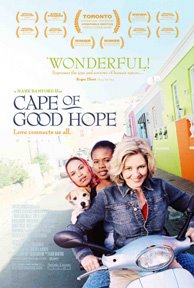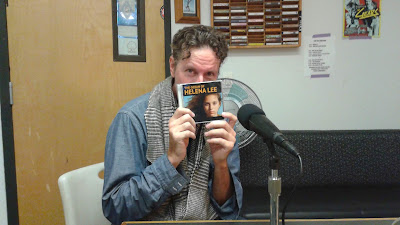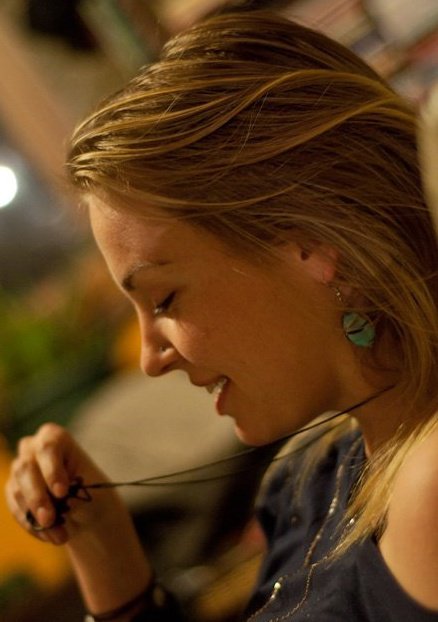Mark Bamford comes Center Stage to discuss his new film CAPE OF GOOD HOPE.
Each week Center Stage with Mark Gordon features interviews with actors, directors, producers, composers and writers from film, theatre and performing arts. Center Stage with Mark Gordon airs Tuesday nights at 7PM pacific standard time on KXLU Los Angeles, 88.9 FM and streaming "live" at www.kxlu.com

The new South Africa is revealed in Cape of Good Hope, a colorful and vibrant mosaic of love and hope. A profoundly optimistic film, Cape of Good Hope is, in the words of writer-director Mark Bamford, “a movie about people just trying to live. It’s not about black and white, it’s not about politics, but about human beings.”
In the tradition of such rich, multi-layered films as Ang Lee’s Eat, Drink, Man, Woman, Mira Nair’s Monsoon Wedding, and Robert Altman and John Sayles’s sociological slice-of-life pictures, Cape of Good Hope beautifully interweaves a number of storylines, all revolving around a Cape Town animal rescue shelter.

The faces of Hope are: Jean Claude (Eriq Ebouaney of Raoul Peck’s award-winning film, Lumumba), a refugee from war-torn Congo who finds himself torn between love and the promise of asylum in the West; Lindiwe (Nthati Moshesh), a single mother and housekeeper trying to make a life for herself and her son while finding a way out of the township once and for all; Sharifa (Quanita Adams) and Habib (David Isaacs), a young Muslim couple unable to have children of their own yet desperate to have a family; Morne (Morne Visser), a recently widowed vet who wants to believe that true love can strike twice; and Kate (Debbie Brown), the emotionally guarded founder of the animal shelter, who seems to relate better to stray dogs than to people.

Cape of Good Hope is the first feature film written and directed by Mark Bamford—award-winning director of the short film, Hero—along with his wife, co-writer and producing partner, Suzanne Kay (daughter of show business legend Diahann Carroll). Themselves recent transplants to South Africa, the couple found inspiration for Cape of Good Hope through their experiences working as volunteers with children and refugees.
Filmed entirely on location in the Cape Town coastal community of Hout Bay, and cast solely with African actors, Cape of Good Hope substitutes a hard-won, deeply felt sense of humanism for the clichés and political bombast audiences are familiar with from many films set in Africa.
CAPE OF GOOD HOPE was filmed entirely on location in the Cape Town coastal community of Hout Bay.
107 minutes. PG 13 for mature situations including some violence, sexual content and brief strong language.

The new South Africa is revealed in Cape of Good Hope, a colorful and vibrant mosaic of love and hope. A profoundly optimistic film, Cape of Good Hope is, in the words of writer-director Mark Bamford, “a movie about people just trying to live. It’s not about black and white, it’s not about politics, but about human beings.”
In the tradition of such rich, multi-layered films as Ang Lee’s Eat, Drink, Man, Woman, Mira Nair’s Monsoon Wedding, and Robert Altman and John Sayles’s sociological slice-of-life pictures, Cape of Good Hope beautifully interweaves a number of storylines, all revolving around a Cape Town animal rescue shelter.

The faces of Hope are: Jean Claude (Eriq Ebouaney of Raoul Peck’s award-winning film, Lumumba), a refugee from war-torn Congo who finds himself torn between love and the promise of asylum in the West; Lindiwe (Nthati Moshesh), a single mother and housekeeper trying to make a life for herself and her son while finding a way out of the township once and for all; Sharifa (Quanita Adams) and Habib (David Isaacs), a young Muslim couple unable to have children of their own yet desperate to have a family; Morne (Morne Visser), a recently widowed vet who wants to believe that true love can strike twice; and Kate (Debbie Brown), the emotionally guarded founder of the animal shelter, who seems to relate better to stray dogs than to people.

Cape of Good Hope is the first feature film written and directed by Mark Bamford—award-winning director of the short film, Hero—along with his wife, co-writer and producing partner, Suzanne Kay (daughter of show business legend Diahann Carroll). Themselves recent transplants to South Africa, the couple found inspiration for Cape of Good Hope through their experiences working as volunteers with children and refugees.
Filmed entirely on location in the Cape Town coastal community of Hout Bay, and cast solely with African actors, Cape of Good Hope substitutes a hard-won, deeply felt sense of humanism for the clichés and political bombast audiences are familiar with from many films set in Africa.
CAPE OF GOOD HOPE was filmed entirely on location in the Cape Town coastal community of Hout Bay.
107 minutes. PG 13 for mature situations including some violence, sexual content and brief strong language.


Comments